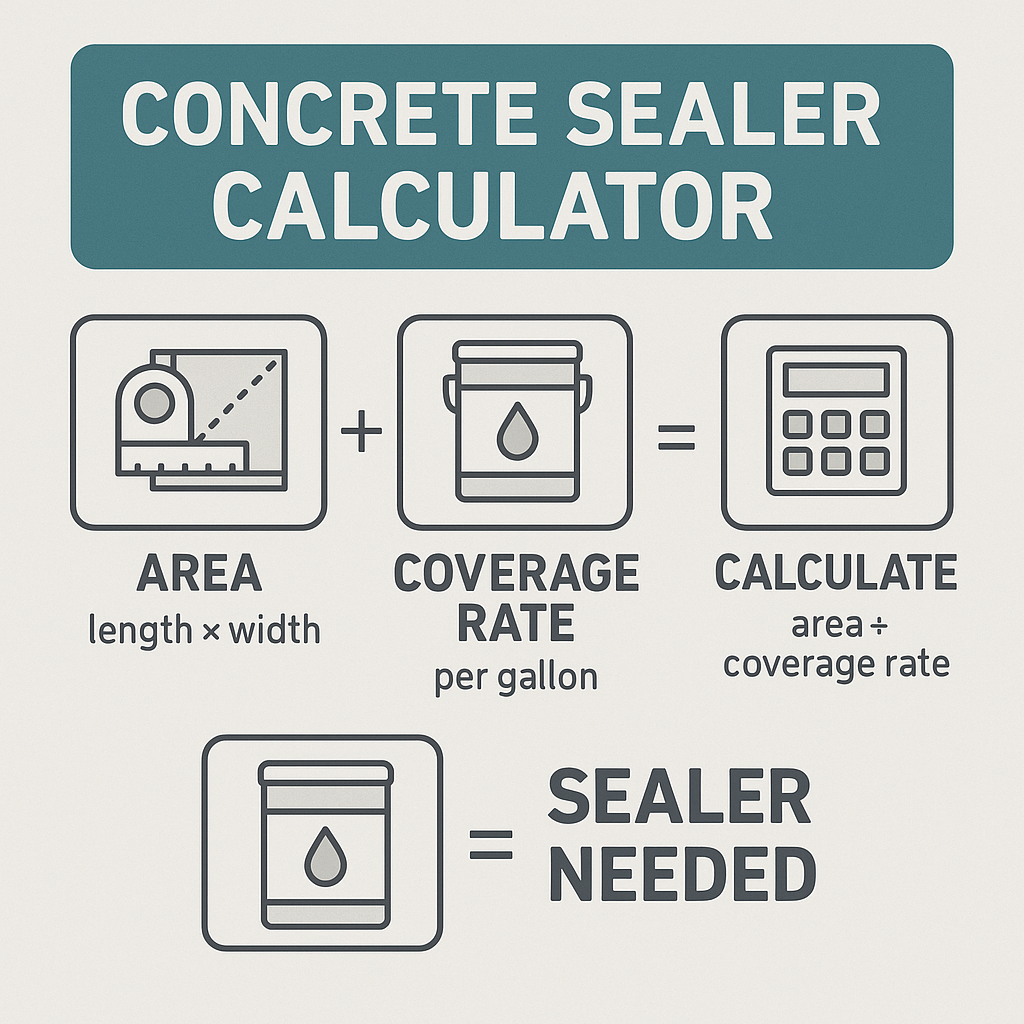Free Concrete Sealer Calculator Online
Sealing concrete is one of the most effective ways to protect surfaces from moisture, stains, chemicals, and wear over time. Whether you’re working on a driveway, patio, warehouse floor, or garage, applying a concrete sealer helps extend the surface’s lifespan and enhance its appearance. A concrete sealer calculator from Construction Calculators ensures you apply the right amount of sealer for uniform coverage, material savings, and a professional-grade finish.
What Is a Concrete Sealer Calculator?
A concrete sealer calculator is a simple tool that estimates how much sealer you need for a specific concrete surface. It uses measurements like area size, sealer coverage rate, and number of coats to calculate the total volume of sealer required in gallons or liters. This eliminates guesswork and ensures your project runs smoothly without interruptions or waste.
Contractors, homeowners, and maintenance teams use these calculators to estimate materials more accurately and budget effectively. Different sealers have varying coverage rates depending on porosity, viscosity, and surface conditions, making precise planning essential.

Why Use a Concrete Sealer Calculator?
Applying too little sealer can leave parts of the surface unprotected, leading to early deterioration, while over-application wastes time and money. A concrete sealer calculator helps:
- Avoid under- or over-buying
- Ensure consistent application across the surface
- Plan and budget accurately
- Minimize material waste and overspending
- Schedule deliveries and labor efficiently
Whether you’re sealing decorative concrete or industrial floors, using the right amount of product improves results and extends performance.
Required Inputs for Accurate Calculation
To calculate the required amount of sealer, the following inputs are needed:
- Length of surface area (in feet or meters)
- Width of surface area (in feet or meters)
- Number of coats (commonly 1 or 2)
- Coverage rate of the sealer (usually provided by the manufacturer in square feet per gallon)
Some calculators also allow for surface porosity selection or custom coverage rates based on surface condition.
Concrete Sealer Coverage Formula
The general formula used to calculate sealer requirements is:
For example:
- $$Surface dimensions: 40 ft x 30 ft = 1200 sq ft$$
- 2 coats required
- Sealer covers 200 sq ft per gallon
This means you would need approximately 12 gallons of sealer to complete the project.
Factors That Influence Sealer Coverage
Coverage rates vary depending on several factors:
- Surface Porosity: Highly porous concrete absorbs more sealer. New concrete is usually more absorbent than sealed or polished surfaces.
- Type of Sealer: Solvent-based, water-based, acrylic, epoxy, and polyurethane sealers all have different application rates.
- Application Method: Sprayers, rollers, and brushes yield different consumption rates.
- Number of Coats: Multiple coats offer better protection but increase material needs.
- Surface Texture: Rough or broom-finished surfaces require more product than smooth or troweled concrete.
Types of Concrete Sealers and Their Typical Coverage Rates
- Acrylic Sealers: 150–250 sq ft per gallon per coat
- Penetrating Sealers: 200–400 sq ft per gallon
- Polyurethane Sealers: 200–300 sq ft per gallon
- Epoxy Coatings: 100–200 sq ft per gallon
- Silane/Siloxane Sealers: 250–400 sq ft per gallon
Always consult the manufacturer’s specifications to determine the accurate coverage rate for the product you’re using.
Step-by-Step Example Calculation
Suppose you’re sealing a residential garage floor:
- $$Size: 20 ft x 22 ft = 440 sq ft$$
- Sealer type: Water-based acrylic (coverage = 200 sq ft per gallon)
- Number of coats: 2
You would round up to 5 gallons to account for minor waste and ensure full coverage.
Additional Considerations
- Cure Time: Allow the concrete to cure for at least 28 days before applying sealer.
- Surface Preparation: Clean the surface thoroughly and repair cracks or holes.
- Weather Conditions: Apply sealer in temperatures between 50°F–90°F. Avoid rain within 24 hours of application.
- Reapplication Schedule: Most sealers require reapplication every 2–5 years depending on exposure.
Benefits of Accurate Sealer Estimation
Accurate estimation using a concrete sealer calculator brings several benefits:
- Ensures consistent protective coating
- Improves durability and stain resistance
- Enhances concrete color and appearance
- Reduces chances of slip hazards due to puddling
- Cuts costs by avoiding over-purchase
- Increases confidence in professional planning
Where Concrete Sealer Calculators Are Commonly Used
- Residential Driveways and Patios
- Commercial Parking Garages
- Industrial Warehouse Floors
- Retail Storefronts
- Airport Runways and Sidewalks
- Stained or Stamped Concrete Surfaces
Whether you’re handling a small walkway or sealing hundreds of square feet of warehouse flooring, accurate product estimation is essential to success.
Common Mistakes to Avoid
- Ignoring manufacturer specs: Each sealer has a unique coverage rate.
- Skipping surface prep: Dust, oil, and debris can block absorption.
- Not accounting for porosity: Sealing older or more porous concrete will require more product.
- Misjudging coat thickness: Applying too thickly wastes product and can lead to uneven drying.
- Forgetting weather factors: Hot, windy, or damp weather alters drying time and application success.
Related Tools to Use Alongside the Calculator
- Concrete Volume Calculator
- Crack Filler Estimator
- Surface Cleaning Cost Estimator
- Paint or Color Tint Volume Calculator
Combining these tools gives a full picture of the project’s scope, timeline, and required materials.
Conclusion
A concrete sealer calculator is an indispensable tool for contractors, DIYers, and facility managers working with concrete surfaces. With a few simple measurements and knowledge of your chosen sealer, you can plan your project with accuracy, confidence, and cost-efficiency. Avoid the hassle of running out of product or overbuying by using a calculator before you begin. Whether for a residential driveway or a commercial warehouse, proper sealer estimation ensures a smoother process and a stronger, better-protected surface. The Concrete Calculators platform also includes tools like the Concrete Block Fill Calculator and the Slab Thickness Calculator to further streamline your material planning and improve jobsite efficiency.
